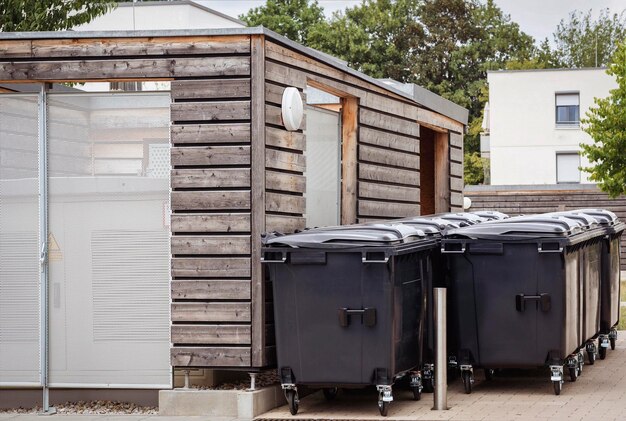Smart Waste Management: Recycling Solutions for US Homes

Smart waste management integrates technology with traditional methods to enhance recycling efficiency, reduce environmental impact, and promote sustainable living in US homes through innovative solutions and practices.
Smart waste management is revolutionizing how US households handle recycling, offering innovative approaches to minimize environmental impact and promote sustainability. By embracing these cutting-edge solutions, homeowners can significantly contribute to a greener future.
Understanding Smart Waste Management
Smart waste management goes beyond traditional recycling by incorporating technology and data-driven insights to improve efficiency and reduce waste. It’s about making informed decisions and embracing innovative solutions to create a more sustainable future.
This involves not only separating recyclables but also understanding the composition of our waste and optimizing the process for maximum effectiveness. Here’s what smart waste management entails:
Data-Driven Recycling
One of the core principles of smart waste management is leveraging data to understand waste patterns and improve recycling rates. By analyzing the types and quantities of waste generated, municipalities and homeowners can identify areas for improvement and tailor their recycling efforts accordingly.
Technology Integration
From smart bins to mobile apps, technology plays a crucial role in modern waste management. These tools help to streamline the recycling process, making it easier for individuals to participate and ensuring that materials are properly sorted and processed.
- Smart Bins: Equipped with sensors to monitor fill levels and optimize collection routes.
- Mobile Apps: Provide information on local recycling guidelines and schedules.
- Data Analytics: Help track recycling rates and identify areas for improvement.
Ultimately, smart waste management is about making informed decisions and adopting innovative technologies to minimize our environmental footprint. By embracing these principles, we can create a more sustainable future for generations to come.

In conclusion, understanding the principles of smart waste management is the first step towards creating a more sustainable home. By embracing data-driven insights and integrating technology, we can significantly improve our recycling efforts and reduce our impact on the planet.
Benefits of Recycling for US Homes
Recycling offers numerous benefits for both individual households and the environment as a whole. By actively participating in recycling programs, US homeowners can contribute to a more sustainable future and reap several advantages.
From conserving natural resources to reducing landfill waste, the benefits of recycling are far-reaching. Here’s a look at some of the key advantages:
Conserving Natural Resources
Recycling helps to conserve valuable natural resources by reducing the need to extract raw materials from the earth. This includes resources like trees, minerals, and fossil fuels, which are essential for producing various goods and products.
Reducing Landfill Waste
One of the most significant benefits of recycling is its ability to reduce the amount of waste sent to landfills. By diverting materials from landfills, we can help to extend their lifespan and minimize the environmental impact associated with landfill waste. This has impacts from reducing soil and water contamination, to lowering our carbon footprint as a society.
- Decreased Pollution: Less waste in landfills means less pollution of air, water, and soil.
- Energy Savings: Recycling often requires less energy than producing new products from raw materials.
- Economic Benefits: Recycling creates jobs and stimulates economic growth in the recycling industry.
By participating in recycling programs, US homeowners can enjoy a range of benefits, from conserving natural resources to reducing landfill waste. It’s a win-win situation for both individuals and the environment.
These benefits extend not only to the environment and the economy, but can also translate to a source of family pride, as parents can take satisfaction from teaching their children about stewardship and the importance of smart waste management.
Essential Recycling Solutions for Every US Home
Implementing effective recycling solutions in your US home doesn’t have to be complicated. With the right tools and strategies, you can easily integrate recycling into your daily routine and make a positive impact on the environment.
Here are some essential recycling solutions that every US home should consider:
Basic Recycling Bins
Start with the basics by providing dedicated recycling bins for different types of materials, such as paper, plastic, and glass. Clearly label each bin for easy identification and encourage household members to sort their waste accordingly. By offering a visible and easily accessible container in key areas in the home, it’s likely that your family will correctly sort more of your household waste.
Composting Systems
Consider setting up a composting system for food scraps and yard waste. Composting not only reduces landfill waste but also creates nutrient-rich soil that can be used in your garden. If you don’t have outdoor space, you can use an indoor composting bin or worm composting system instead.
It is not necessary to maintain a full outdoor composting bin – many towns and municipalities will maintain a single destination for composting, as well as regular pickups for yard waste that can be introduced into these systems.
- Curbside Collection: Check if your local municipality offers curbside recycling collection services.
- Drop-Off Centers: Locate nearby recycling drop-off centers for materials not accepted in curbside programs.
- Community Events: Participate in community recycling events and workshops to learn more about recycling best practices.
Implementing these essential recycling solutions is a simple yet effective way to reduce your environmental impact and promote sustainability in your US home. By making recycling a part of your daily routine, you can contribute to a greener future for generations to come.
Advanced Technologies in Waste Management
As technology continues to evolve, so too does the field of waste management. Advanced technologies are revolutionizing how we handle waste, offering innovative solutions to improve efficiency and reduce environmental impact.
From smart sensors to automated sorting systems, technology is transforming waste management practices. Here’s a look at some of the advanced technologies being used in waste management today:

Smart Sensors
Smart sensors are used to monitor fill levels in waste bins and containers, allowing for more efficient collection routes and reduced fuel consumption. These sensors can also detect the type of waste in a bin, ensuring proper sorting and processing.
Automated Sorting Systems
Automated sorting systems use advanced robotics and artificial intelligence to separate different types of recyclables with greater speed and accuracy. These systems can handle a wide range of materials, from plastics to metals, and can significantly improve recycling rates.
Combining these sorting systems with other technology such as optical scanners, the composition of waste streams can be reliably identified, as well as separated, allowing each of these items to be introduced to an individual and appropriate recycling system.
- Waste-to-Energy Conversion: Technologies that convert waste into usable energy, such as electricity or heat.
- Advanced Landfill Technologies: Methods for capturing and treating landfill gases to reduce greenhouse gas emissions.
- Blockchain Technology: Using blockchain to track and verify the recycling process, ensuring transparency and accountability.
These technologies are paving the way for a more sustainable future by improving efficiency, reducing environmental impact, and promoting a circular economy, not only reducing our carbon footprint on a household level but by providing insights for municipalities and policymakers in implementing environmentally conscious infrastructure.
Using waste to energy technologies can also reduce the dependency on landfills, which can further reduce negative environmental impacts of waste management.
Overcoming Common Recycling Challenges
Despite the many benefits of recycling, there are several challenges that US homeowners may encounter when trying to implement effective recycling practices. Addressing these challenges is essential for maximizing recycling rates and minimizing environmental impact.
From contamination to lack of awareness, here are some common recycling challenges and strategies for overcoming them:
Contamination
Contamination occurs when non-recyclable materials are mixed with recyclable items, rendering the entire batch unusable. To prevent contamination, it’s essential to educate household members about what can and cannot be recycled, and to ensure that all recyclables are clean and dry.
Lack of Awareness
Many people are unaware of the specific recycling guidelines in their local area, leading to confusion and improper sorting. To address this issue, municipalities and community organizations should provide clear and accessible information about recycling guidelines through various channels, such as websites, brochures, and social media.
It can also be important to create a household culture of environmentalism, making the act of recycling into something the family supports together. Doing so reduces the likelihood that recycling norms are broken due to laziness or forgetfulness.
- Inadequate Infrastructure: Advocate for improved recycling infrastructure in your community, such as more drop-off centers and better sorting facilities.
- Limited Participation: Encourage friends, family, and neighbors to participate in recycling programs and promote the benefits of recycling through education and outreach.
- Market Fluctuations: Stay informed about market conditions for recycled materials and support efforts to create stable and sustainable markets for these materials.
By addressing these common recycling challenges head-on, US homeowners can play a significant role in improving recycling rates and creating a more sustainable future for their communities.
Inspiring Smart Waste Management Practices
To inspire smart waste management, it’s helpful to view how other people are positively impacting their community. It can also be worthwhile to view the impact on a higher level, for example on a city or state level.
Holistic Community Projects
One thing that has proven to be extraordinarily effective is to introduce programs that have holistic benefits to the community. For example, in New York City, the organization GrowNYC has programs to teach people about zero waste practices, operate farmer’s markets, and provide education about recycling programs. As a result, there are numerous points of contact for people with this approach.
Financial Incentives
Providing people with financial incentives to make a change in their behavior is an incredibly effective way to incentivize positive smart waste management practices.
For example, some states offer redeemable deposits for aluminum cans, incentivizing people to ensure they are responsibly introduced to recycling practices, while simultaneously reducing litter from improperly disposed beverage containers.
- Financial Penalties: Municipalities can increase the penalties of not conforming to recycling requirements.
- Community Education: Working with local businesses to educate people with smart waste practices
- Recognition Programs: Reward individuals or businesses that work to manage waste in a smart way
In summary, smart waste management can be adopted through working with individuals, providing incentives for smarter practice, recognizing when good practices are being adopted, and engaging stakeholders across all levels.
| Key Point | Brief Description |
|---|---|
| ♻️ Smart Recycling | Integrates tech for data-driven and efficient recycling. |
| 🌱 Benefits | Conserves resources, reduces landfill waste, and saves energy. |
| 🗑️ Solutions | Use bins, compost, and participate in local recycling. |
| 💡 Tech | Smart sensors and AI improve waste management. |
FAQ
▼
Smart waste management involves utilizing technology and data-driven insights to optimize recycling processes, reduce waste generation, and minimize environmental impact in US homes.
▼
Recycling helps conserve natural resources, reduces landfill waste, saves energy, and decreases pollution, contributing to a sustainable future for both individuals and the environment.
▼
Essential solutions include using dedicated recycling bins, setting up composting systems for food scraps, and participating in local curbside recycling collection or drop-off centers.
▼
Advanced technologies like smart sensors and automated sorting systems enhance waste management by monitoring fill levels, improving accuracy, and optimizing the recycling process in general.
▼
Common challenges include contamination and lack of awareness, which can be overcome through education, ensuring recyclables are clean, and providing accessible information about local guidelines.
Conclusion
By adopting smart waste management practices, US homes can significantly reduce their environmental footprint and contribute to a more sustainable future. From understanding the principles of recycling to implementing advanced technologies, there are numerous ways to make a positive impact and promote a circular economy within your community.





